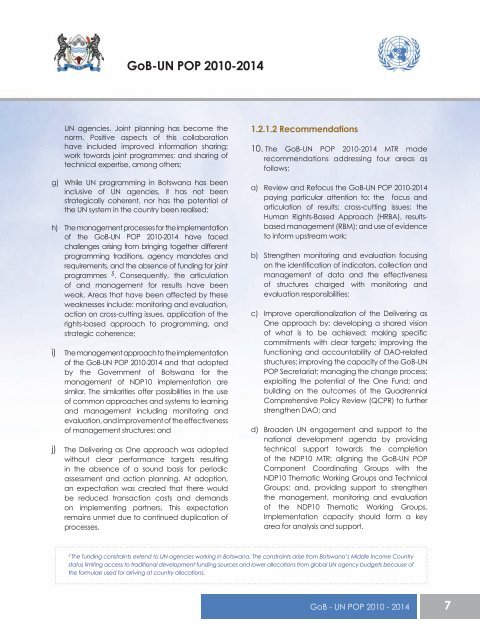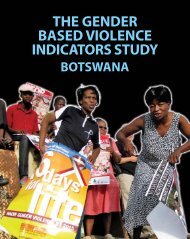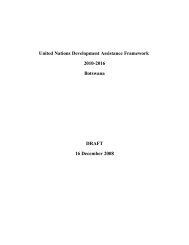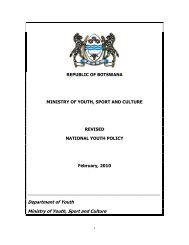GoB-UN POP 2010-2014 - UNFPA Botswana
GoB-UN POP 2010-2014 - UNFPA Botswana
GoB-UN POP 2010-2014 - UNFPA Botswana
- No tags were found...
Create successful ePaper yourself
Turn your PDF publications into a flip-book with our unique Google optimized e-Paper software.
<strong>GoB</strong>-<strong>UN</strong> <strong>POP</strong> <strong>2010</strong>-<strong>2014</strong><strong>UN</strong> agencies. Joint planning has become thenorm. Positive aspects of this collaborationhave included improved information sharing;work towards joint programmes; and sharing oftechnical expertise, among others;g) While <strong>UN</strong> programming in <strong>Botswana</strong> has beeninclusive of <strong>UN</strong> agencies, it has not beenstrategically coherent, nor has the potential ofthe <strong>UN</strong> system in the country been realised;h) The management processes for the implementationof the <strong>GoB</strong>-<strong>UN</strong> <strong>POP</strong> <strong>2010</strong>-<strong>2014</strong> have facedchallenges arising from bringing together differentprogramming traditions, agency mandates andrequirements, and the absence of funding for jointprogrammes 5 . Consequently, the articulationof and management for results have beenweak. Areas that have been affected by theseweaknesses include: monitoring and evaluation,action on cross-cutting issues, application of therights-based approach to programming, andstrategic coherence;i) The management approach to the implementationof the <strong>GoB</strong>-<strong>UN</strong> <strong>POP</strong> <strong>2010</strong>-<strong>2014</strong> and that adoptedby the Government of <strong>Botswana</strong> for themanagement of NDP10 implementation aresimilar. The similarities offer possibilities in the useof common approaches and systems to learningand management including monitoring andevaluation, and improvement of the effectivenessof management structures; andj) The Delivering as One approach was adoptedwithout clear performance targets resultingin the absence of a sound basis for periodicassessment and action planning. At adoption,an expectation was created that there wouldbe reduced transaction costs and demandson implementing partners. This expectationremains unmet due to continued duplication ofprocesses.1.2.1.2 Recommendations10. The <strong>GoB</strong>-<strong>UN</strong> <strong>POP</strong> <strong>2010</strong>-<strong>2014</strong> MTR maderecommendations addressing four areas asfollows:a) Review and Refocus the <strong>GoB</strong>-<strong>UN</strong> <strong>POP</strong> <strong>2010</strong>-<strong>2014</strong>paying particular attention to: the focus andarticulation of results; cross-cutting issues; theHuman Rights-Based Approach (HRBA), resultsbasedmanagement (RBM); and use of evidenceto inform upstream work;b) Strengthen monitoring and evaluation focusingon the identification of indicators, collection andmanagement of data and the effectivenessof structures charged with monitoring andevaluation responsibilities;c) Improve operationalization of the Delivering asOne approach by: developing a shared visionof what is to be achieved; making specificcommitments with clear targets; improving thefunctioning and accountability of DAO-relatedstructures; improving the capacity of the <strong>GoB</strong>-<strong>UN</strong><strong>POP</strong> Secretariat; managing the change process;exploiting the potential of the One Fund; andbuilding on the outcomes of the QuadrennialComprehensive Policy Review (QCPR) to furtherstrengthen DAO; andd) Broaden <strong>UN</strong> engagement and support to thenational development agenda by providingtechnical support towards the completionof the NDP10 MTR; aligning the <strong>GoB</strong>-<strong>UN</strong> <strong>POP</strong>Component Coordinating Groups with theNDP10 Thematic Working Groups and TechnicalGroups; and, providing support to strengthenthe management, monitoring and evaluationof the NDP10 Thematic Working Groups.Implementation capacity should form a keyarea for analysis and support.5The funding constraints extend to <strong>UN</strong> agencies working in <strong>Botswana</strong>. The constraints arise from <strong>Botswana</strong>’s Middle Income Countrystatus limiting access to traditional development funding sources and lower allocations from global <strong>UN</strong> agency budgets because ofthe formulae used for arriving at country allocations.<strong>GoB</strong> - <strong>UN</strong> <strong>POP</strong> <strong>2010</strong> - <strong>2014</strong> 7







